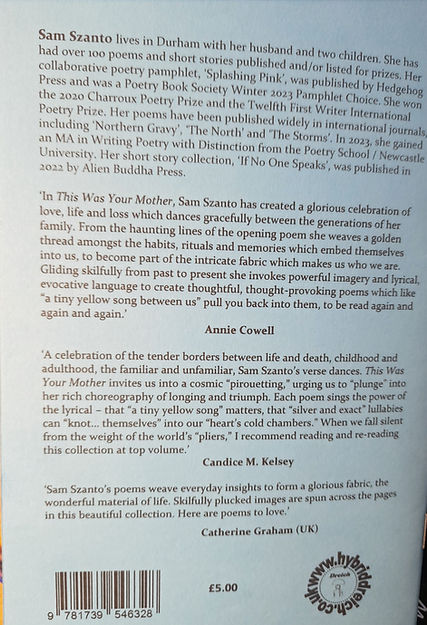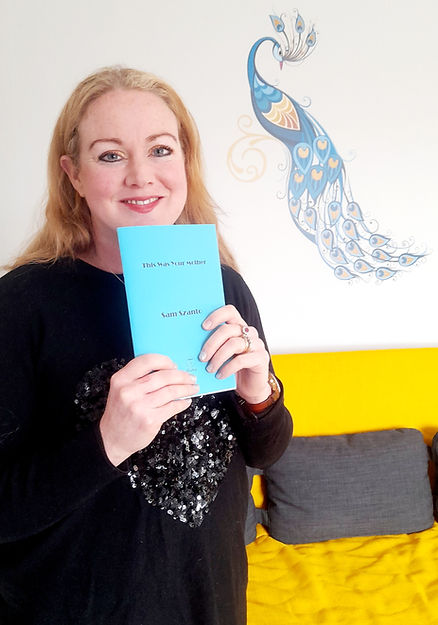Peter Mladinic: 'What counts is not what happened “in real life” but what happens on the page'
- samszanto2
- May 23, 2024
- 5 min read

A chat with Peter Mladinic about his poetry collection The Homesick Mortician (BlazeVOX, 2024)
How would you describe the collection in one sentence?
My book consists of lyrics, narratives in loose blank verse, and persona poems.
The Homesick Mortician is a fabulous title – how did you come up with it?
It just popped into my head one day at work. I retired four years ago, so I had the title in mind long before I even got ‘round to writing the title poem.
How long did the book take to write?
A couple of years. All its poems were published in journals before I started putting them together as one collection.
How did you structure the collection?
I structured it intuitively. The one thing I had in mind was to vary the order as far as the tone and style. For example, I didn’t want to group all the persona poems in one section. I didn’t want to divide the book into separate sections.
How did the design for the cover come about?
The publisher left the cover choice up to me. I looked in public domain at photos and paintings and found a painting by John Singer Sargent that I thought fit the nostalgic mood of the poems.

How did you choose a publisher for the collection, and how much editorial input did they have with the book?
I had already a number of poems published in the BlazeVOX journal already, and before I ever submitted to the journal, a close friend, David Reich, had published a novel with BlazeVOX. My book is dedicated to him.
What has been the reaction to the book? Have there been any individual reactions that have surprised you?
The reaction is favorable. I haven’t seen any reviews yet, but of course I’m hoping to, as I very much want the book to be bought (not only to help me but to support the publisher). Plus, as a writer I write to be read.
Do you have a favourite poem from the book?
At the moment my favorite poem in the book is “Light and Dark.” This is a very dark poem but I like the intensity of the language in it. I am an animal rights advocate, and the poem is about the execution of an elephant. In my previous book, Voices from the Past, there’s a “watered down” version of “Light and Dark.”
What do you feel the primary emotional tone or tones of the book are?
I feel the primary emotional tone in the book is loneliness. I’m relatively happy and at the same time lonely. Not depressed, but lonely simply because I’m human.
How do your family/friends feel about the book?
My friends who have read the book have told me they enjoy it. Most of those are writers, whose book I have enjoyed reading.
There’s a few very interesting persona poems in the collection (‘Schaeffer Speaking’, for example) – I wonder what motivates you to write a poem like that, and how it feels to speak in someone else’s voice?
Before and shortly after the Covid pandemic I wrote a number of Schaeffer poems, a liberating way of writing about myself. But I set Schaeffer aside well over a year ago. Some persona poems “Eternal Virgin” and “Love Will Come” take the voices of public people, while other voices belong to private people, and some, for better or worse, to convicted criminals. Most of these characters are conflicted in some way.
One my favourite poems in the book is the surreal ‘Blister’. I admire anyone who can write a surreal poem well, because I think it’s very difficult. I wonder, if it’s not too abstract a question, what inspires you to write a poem that is fundamentally surreal? And what you think surrealism offers the writer and the reader?
What inspires me to write a surreal poem is the fun of it. I love to try my hand at new things. I don’t want to end up writing the same poem over and over. Why write? Because it is pleasurable. Part of the pleasure is in discovery.
In general, would you say your poetry is inspired more by place or people?
My poems are inspired equally by place and people. Just as much, they are inspired by poems by others poets. I read a great lyric, such as Keith Douglas’ “The Behavior of Fish in an Egyptian Tea Garden", and feel I want to do it too.
Would you say you have more of a pull towards a lyric or a narrative poem? Which do you prefer to write, or can they co-exist peacefully in one work?
I just wrote a lyric today that has narrative elements, so I feel they can co-exist. But whether the poem is lyric or narrative mostly depends on what triggers it. A memory came up the other day of a remark at a wedding. My narrative poem started at a wedding and ended at a funeral. The narratives are based on memory, the lyrics more on idea.
There’s a wide-ranging use of people’s names in the collection, giving many of the poems a conversational tone. I wondered if you could say anything about this decision to use names?
Some names are those of people I knew and others are made up. There’s something liberating about making up a name; I associate that with Emily Dickinson’s “tell the truth but tell it slant.” I feel compelled to do that. What counts is not what happened “in real life” but what happens on the page.
Can you talk about the importance of angels in the collection?
This question surprised me. It’s interesting. To balance the abiding mortality in the book (with an undertaker in its title), there is the immortal nature of angels, the corporeal body co-existing with the spiritual.
Do you have a particular writing routine?
I write almost exclusively in the early morning. My mind seems freshest then. When I worked I always taught 8 AM classes and didn’t have the leisure I have now. For years I wrote mostly in cafes and restaurants, in public, with a pen in a notebook. Now I write at home and on a keyboard in my phone’s notepad app. But I like writing longhand and I own a great fountain pen. I hope to do more writing in a notebook in the near future. I’m interested in the setting for writing (time and place) and in the instruments. As for poetry, there’s no one way to write it, no formula; if there were, it wouldn’t be poetry.
Buy The Homesick Mortician here:










Excellent interview. Thoughtful, penetrating questions and honest, meaningful, fascinating answers.